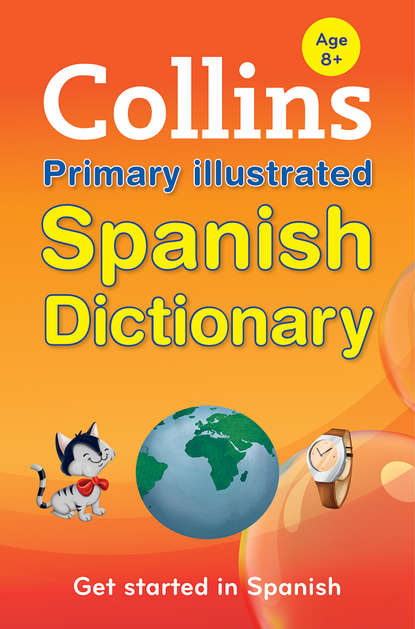
Полная версия:
Collins Primary Dictionaries
2 since La conozco desde niño. I’ve known her since I was a child. ¿Desde cuándo vives aquí? How long have you been living here?
desde entonces since then desde luego of course
desear VERB
to wish Te deseo mucha suerte. I wish you lots of luck.
desenchufar VERB
to unplug
el deseo NOUN
wish
el desfile NOUN
parade
la desgracia NOUN
tragedy Su muerte fue una auténtica desgracia. His death was an absolute tragedy. por desgracia unfortunately Por desgracia he vuelto a suspender. Unfortunately I’ve failed again.
deshacer VERB
to untie
el desierto NOUN
desert
desnatado (FEM desnatada) ADJECTIVE
skimmed
desnudarse VERB
to get undressed
desnudo (FEM desnuda) ADJECTIVE
naked
desobedecer VERB
to disobey
desobediente (FEM desobediente) ADJECTIVE
disobedient
el desodorante NOUN
deodorant
desordenado (FEM desordenada) ADJECTIVE
untidy Tengo la habitación muy desordenada. My room’s really untidy.

despacio ADVERB
slowly Conduce despacio. Drive slowly.
¡Despacio! Take it easy!
despedir VERB
to say goodbye to Se despidieron en la estación. They said goodbye at the station.
el despertador NOUN
alarm clock
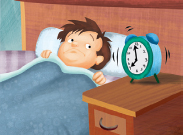
despertar VERB
to wake up No me despiertes hasta las once. Don’t wake me up until eleven o’clock.
despierto (FEM despierta) ADJECTIVE
awake A las siete ya estaba despierto. He was already awake by seven o’clock.
después ADVERB
1 later Ellos llegaron después. They arrived later. un año después a year later
2 next ¿Qué viene después? What comes next? después de after Tu nombre está después del mío. Your name comes after mine. Después de comer fuimos de paseo. After lunch we went for a walk.
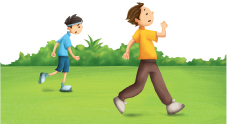
el destornillador NOUN
screwdriver
destrozar VERB
to wreck Tu perro ha destrozado la silla. Your dog has wrecked the chair.
destruir VERB
to destroy Los huracanes destruyen edificios enteros. Hurricanes can destroy whole buildings.
la desventaja NOUN
disadvantage
el detalle NOUN
detail No recuerdo todos los detalles. I don’t remember all the details.
detener VERB
1 to stop ¡Detenlos! Stop them!
2 to arrest Han detenido a los ladrones. They’ve arrested the thieves.
■ detenerse to stop Nos detuvimos en el semáforo. We stopped at the lights.
el detergente NOUN
detergent
detrás ADVERB
behind El resto de los niños vienen detrás. The rest of the children are coming on behind. detrás de behind Se escondió detrás de un árbol. He hid behind a tree.
devolver VERB
1 to give back ¿Me puedes devolver el libro que te presté? Could you give me back the book I lent you?
2 to take back Devolví la falda porque me iba pequeña. I took the skirt back as it was too small for me.
3 to throw up
di VERB
1 ▷see decir Di, ¿qué te parece? Tell me, what do you think?
2 ▷see dar Se lo di a ella. I gave it to her.
el día NOUN
day Pasaré dos días en la playa. I’ll spend a couple of days at the beach. Es de día. It’s daylight. ¿Qué día es hoy? What day is it today?/What’s the date today?
Language tip
¿qué día es hoy? has two meanings. It can be translated as what day is it today? and what’s the date today?
un día de fiesta a public holiday el día de los enamorados Saint Valentine’s Day el día de los Santos Inocentes the Feast of the Holy Innocents
Did you know…?
In Spanish-speaking countries the day people play practical jokes on each other is 28 December día de los Santos Inocentes.
al día siguiente the following day ¡Buenos días! Good morning! todos los días every day
el diablo NOUN
devil
diagonal ADJECTIVE, FEM NOUN
diagonal en diagonal diagonally
el diamante NOUN
diamond
el diámetro NOUN
diameter
diario
diario can be an adjective or a noun.
A (FEM diaria) ADJECTIVE
daily la rutina diaria the daily routine la ropa de diario everyday clothes a diario every day Va al gimnasio a diario. He goes to the gym every day.
B MASC NOUN
diary
la diarrea NOUN
diarrhoea
dibujar VERB
to draw
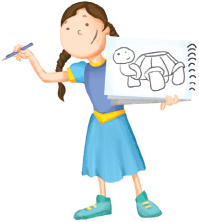
No sé dibujar. I can’t draw.
el dibujo NOUN
drawing Me hizo un dibujo. She did me a drawing. los dibujos animados cartoons
el diccionario NOUN
dictionary
dicho VERB ▷see decir Ya te he dicho que no lo quiero. I’ve already told you that I don’t want it.
diciembre MASC NOUN
December
Language tip
Months are not written with a capital letter in Spanish.
en diciembre in December Nació el seis de diciembre. He was born on the sixth of December.
diciendo VERB ▷see decir Como iba diciendo … As I was saying …
diecinueve (FEM diecinueve) ADJECTIVE, PRONOUN
nineteen Tengo diecinueve años. I’m nineteen.
el diecinueve de julio the nineteenth of July Nació el diecinueve de julio. He was born on the nineteenth of July.
dieciocho (FEM dieciocho) ADJECTIVE, PRONOUN
eighteen Tengo dieciocho años. I’m eighteen.
el dieciocho de abril the eighteenth of April Nació el dieciocho de abril. He was born on the eighteenth of April.
dieciséis (FEM dieciséis) ADJECTIVE, PRONOUN
sixteen Tengo dieciséis años. I’m sixteen.
el dieciséis de febrero the sixteenth of February Nació el dieciséis de febrero. He was born on the sixteenth of February.
diecisiete (FEM diecisiete) ADJECTIVE, PRONOUN
seventeen Tengo diecisiete años. I’m seventeen.
el diecisiete de enero the seventeenth of January Nació el diecisiete de enero. He was born on the seventeenth of January.
el diente NOUN
tooth Me lavo los dientes tres veces al día. I clean my teeth three times a day. un diente de leche a milk tooth un diente de ajo a clove of garlic
la dieta NOUN
diet una dieta vegetariana a vegetarian diet
estar a dieta to be on a diet
diez (FEM diez) ADJECTIVE, PRONOUN
ten Tengo diez años. I’m ten.
Son las diez. It’s ten o’clock. el diez de agosto the tenth of August Nació el diez de agosto. He was born on the tenth of August.
la diferencia NOUN
difference ¿Qué diferencia hay entre los dos? What’s the difference between the two?
diferenciar VERB
¿En qué se diferencian? What’s the difference between them? Sólo se diferencian en el tamaño. The only difference between them is their size.
diferente (FEM diferente) ADJECTIVE
different
difícil (FEM difícil) ADJECTIVE
difficult Es un problema difícil de entender. It’s a difficult problem to understand.
la digestión NOUN
digestion
hacer la digestión to digest
digital (FEM digital) ADJECTIVE
digital una cámara digital a digital camera
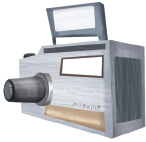
una huella digital a fingerprint
digo VERB ▷see decir Porque lo digo yo. Because I say so.
dije VERB ▷see decir ¡Yo no dije eso! I didn’t say that!
el dinero NOUN
money No tengo más dinero. I haven’t got any more money. dinero suelto loose change
dio VERB ▷see dar Me dio un libro. He gave me a book.
Dios MASC NOUN
God
el dios (PL los dioses) NOUN
god
dirá VERB ▷see decir ¿Qué dirá mi madre cuando se entere? ¿What will my mother say when she finds out?
la dirección (PL las direcciones) NOUN
1 direction Íbamos en dirección equivocada. We were going in the wrong direction. una calle de dirección única a one-way street
2 address Apúntame tu dirección aquí. Can you write your address down here for me? dirección de correo electrónico e-mail address
directo (FEM directa) ADJECTIVE
direct Hay un tren directo a Valencia. There’s a direct train to Valencia. una pregunta directa a direct question
el director la directora NOUN
1 headteacher
2 manager
3 director
el disco NOUN
record un disco compacto a compact disc el disco duro the hard disk
la discusión (PL las discusiones) NOUN
argument Tuve una discusión con mi madre. I had an argument with my mother.
discutir VERB
to argue Siempre discuten por dinero. They’re always arguing about money. Discutió con su madre. He had an argument with his mother.
el disfraz (PL los disfraces) NOUN
costume un disfraz de vaquero a cowboy costume una fiesta de disfraces a fancy-dress party
disfrazarse VERB
disfrazarse de to dress up as Mi amiga se disfrazó de hada. My friend dressed up as a fairy.
disfrutar VERB
to enjoy oneself Disfruté mucho en la fiesta. I really enjoyed myself at the party.
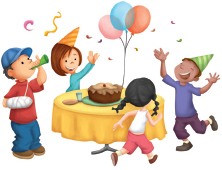
Disfruto leyendo. I enjoy reading.
disgustado (FEM disgustada) ADJECTIVE
upset
Language tip
Be careful! disgustado does not mean disgusted.
disimular VERB
to hide Intentó disimular su enfado. He tried to hide his annoyance. No disimules, sé que has sido tú. Don’t bother pretending, I know it was you.
el disparate NOUN
silly thing He hecho muchos disparates en mi vida. I’ve done a lot of silly things in my life. No digas disparates. Don’t talk rubbish.
el disparo NOUN
shot
la distancia NOUN
distance la distancia entre dos coches the distance between two cars ¿Qué distancia hay entre Madrid y Barcelona? How far is Madrid from Barcelona? ¿A qué distancia está la estación? How far’s the station? a veinte kilómetros de distancia twenty kilometres away
distinguir VERB
to distinguish Resulta difícil distinguir el macho de la hembra. It’s difficult to distinguish the male from the female. No distingue entre el rojo y el verde. He can’t tell the difference between red and green. Se parecen tanto que no los distingo. They’re so alike that I can’t tell them apart.
distinto (FEM distinta) ADJECTIVE
different Carlos es distinto a los demás. Carlos is different to everyone else.
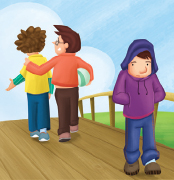
distintos several distintas clases de coches several types of car
la distracción (PL las distracciones) NOUN
pastime Cocinar es mi distracción favorita. My favourite pastime is cooking.
distraer VERB
1 to keep … entertained Les pondré un vídeo para distraerlos. I’ll put a video on to keep them entertained. Me distrae mucho escuchar música. I really enjoy listening to music.
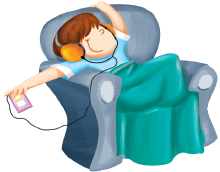
2 to distract No me distraigas, que tengo trabajo. Don’t distract me. I’ve got work to do.
distraído (FEM distraída) ADJECTIVE
absent-minded Mi padre es muy distraído. My father is very absent- minded. Perdona, estaba distraído. Sorry, I wasn’t paying attention.
la diversión (PL las diversiones) NOUN
entertainment
Language tip
Be careful! diversión does not mean diversion.
divertido (FEM divertida) ADJECTIVE
funny Fue muy divertido. It was great fun.
divertir VERB
to entertain Nos divirtió con sus cuentos. He entertained us with his stories.
■ divertirse to have a good time
dividir VERB
to divide El libro está dividido en dos partes. The book is divided into two parts. Divide cuatro entre dos. Divide four by two.
■ dividirse to divide/to share
Language tip
dividirse has two meanings. Look at the examples.
Nos dividimos el trabajo entre los tres. We divided the work between the three of us. Se dividieron el dinero de la lotería. They shared the lottery money.
divierto VERB ▷see divertir Me divierto mucho con ellos. I have a good time when I’m with them.
la división (PL las divisiones) NOUN
division en primera división in the first division Ya sabe hacer divisiones. He already knows how to do division.
el DNI ABBREVIATION (= Documento Nacional de Identidad)
ID card
el doble NOUN
twice as much Comes el doble que yo. You eat twice as much as I do. Trabaja el doble que tú. He works twice as hard as you do.
doce (FEM doce) ADJECTIVE, PRONOUN
twelve Tengo doce años. I’m twelve.
Son las doce. It’s twelve o’clock. el doce de diciembre the twelfth of December Nació el doce de diciembre. He was born on the twelfth of December.
la docena NOUN
dozen
el doctor la doctora NOUN
doctor Cuando crezca me gustaría ser doctor. I want to be a doctor when I grow up.
el documental NOUN
documentary
el documento NOUN
document un documento oficial an official document el documento nacional de identidad the identity card
doler VERB
to hurt Me duele el brazo. My arm hurts.
Me duele la cabeza. I’ve got a headache. Me duele la garganta. I’ve got a sore throat.
el dolor NOUN
pain Gritó de dolor. He cried out in pain.
Tengo dolor de cabeza. I’ve got a headache. Tengo dolor de garganta. I’ve got a sore throat. Tengo dolor de estómago. I’ve got a stomachache.
doméstico (FEM doméstica) ADJECTIVE
domestic para uso doméstico for domestic use las tareas domésticas the housework un animal doméstico a pet

el domingo NOUN
Sunday
Language tip
The days of the week are not spelled with a capital letter in Spanish.
La vi el domingo. I saw her on Sunday.
todos los domingos every Sunday el domingo pasado last Sunday el domingo que viene next Sunday
don MASC NOUN
don Juan Gómez Mr Juan Gómez
donde ADVERB
where La nota está donde la dejaste. The note’s where you left it.
dónde ADVERB
where ¿Dónde vas? Where are you going? Le pregunté dónde estaba la catedral. I asked him where the cathedral was. ¿Sabes dónde está? Do you know where he is? ¿De dónde eres? Where are you from? ¿Por dónde se va al cine? How do you get to the cinema?
doña FEM NOUN
doña Marta García Mrs Marta García
dorado (FEM dorada) ADJECTIVE
golden
dormir VERB
to sleep Antonio durmió diez horas. Antonio slept for ten hours. dormir la siesta to have a nap estar medio dormido to be half asleep



